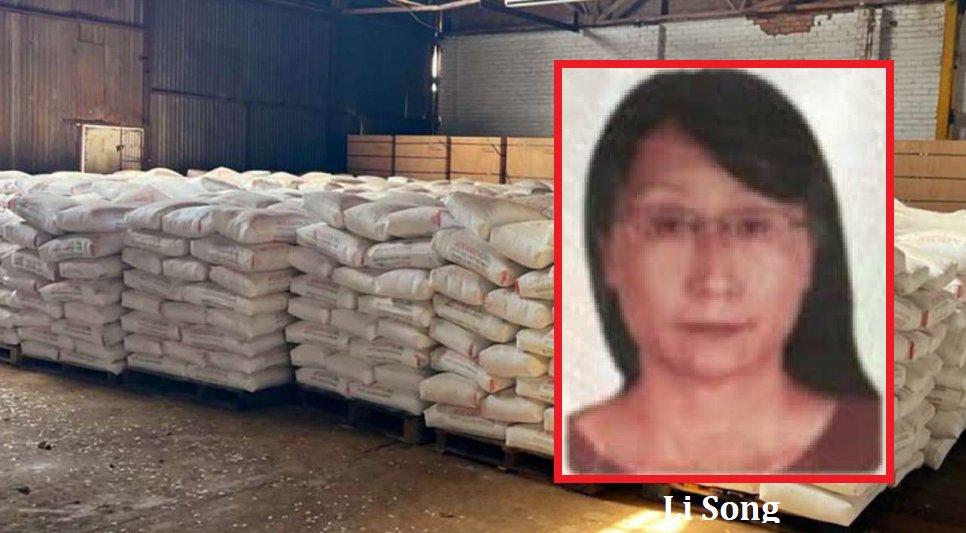Africa
Zimbabwe Authorities Accused Of Protecting Chinese Businesswoman ‘Li Song’ Involved In An Illegal Cyanide Scandal

Authorities in Zimbabwe are being seriously accused of shielding a shadowy and eerie Chinese businesswoman from charges of externalising foreign currency and engaging in wildlife poaching. The woman is said to have purchased cyanide illegally in order to hide her tracks, and she has a wide range of high-level connections in political, diplomatic, state security, and business circles.
According to documents, Li Song, a 52-year-old Chinese national, is being protected by the police, Environmental Management Authority (Ema), and government officials. Li Song purchased and illegally stored approximately 40 tonnes of cyanide at various locations with the intention of using it as evidence in court to thwart the administration of justice or defeat its goals by importing a product with money she illegally sent offshore to China.
Wayne Jardine, a businessman and expert hunter residing in Bulawayo, was handed a portion of the cyanide. There are concerns that cyanide was utilised in wildlife poaching. Criminal syndicates have poisoned Zimbabwe’s wildlife with cyanide, a lethal fast-acting chemical, in addition to poaching and slaughtering animals for their lucrative body parts.
According to documents, Marida Maria Magdalena Van Der Spuy, a former director of Posryn Properties (Pvt) Ltd and a citizen of South Africa, gave the order for the unlawful storage of cyanide on Song’s behalf, breaking both health and safety regulations.
Posryn Properties held the location at 105 Plumtree Road, Bualwayo, where the cyanide was kept. According to the documents, it was purchased from Curechem Overseas (Pvt) Ltd, which is based at 1 Williams Way, Msasa, Harare. After Duration Gold/Clarity Group, the mining business where Song was employed initially, rejected it, it was then moved to the Bulawayo branch, which is located at 28 Josiah Chinamano Street.
Leading chemical supplier Curechem has operations throughout sub-Saharan Africa, including Zambia, Tanzania, India, Mozambique, Ghana, Ivory Coast, Kenya, South Africa, and Zimbabwe. Its headquarters are in Dubai, United Arab Emirates.
The cyanide problem is a major controversy. Song is dealing with externalised foreign exchange expenses and fraud. Her ex-husband Francesco Marconati, who co-directed Eagle Italian Shoes with her, reported her to the authorities, according to a person with direct knowledge of the situation.
The company provides leather shoes, helmets, and baton sticks to the Zimbabwe National Army, Zimbabwe Prison Services, and Zimbabwe Republic Police, among other state organisations. Li Song therefore has contacts with state security structures, government ministries and senior officials, the Office of the President and Cabinet, and ambassadors.
Despite operating in the shadows and the underworld, she is a strong person because of her business contacts as well. She does not want to be photographed, thus it is rare to even see her photos. It’s unlikely that Marconati even has her photos.
Due to a disagreement between the directors in 2020, Marconati filed allegations of fraud, perjury, and externalisation of FX against Song following their divorce and breakup as directors in their respective firms.
In a letter of complaint dated October 20, 2021, Marconati claimed that police assistant commissioner Jealous Nyabasa and his subordinates were shielding Song from prosecution. The letter was directed to Police Commissioner-General Godwin Matanga and copied to the Zimbabwe Anti-Corruption Commission (Zacc).
Nyabasa has come up in this cyanide scandal as well. Even though Song has been the subject of several witness accounts and police reports, investigating officers in Bulawayo and their superiors in Harare, including Nyabasa, seem reluctant to take any further action against her.
Ema has also been putting things off. Despite being under pressure to order the seizure of the cyanide, Song was only given a modest reprimand, a slap on the wrist, and a tiny fee of roughly US$1,000.
However, a few powerful private detectives are putting pressure on Ema and closely monitoring the agency, demanding that the environmental agency take strong action.
It is reported that Song and her associates assured the complainants that she would not face any consequences. It is alleged that covert moves are currently being made to persuade the National Prosecuting Authority to withdraw the charges against her since the cyanide fraud has come to light, making it more challenging to present the chemical as proof of an imported good in order to support the externalisation of foreign exchange.
Contrary to Song’s claims, investigations have revealed that the cyanide was purchased in Harare and transported to Bulawayo for storage, despite her former husband rejecting the product when she attempted to get the company to store it for her gold mine in Bubi, in the Matabeleland region.
In order to demonstrate that she had not externalised monies but rather paid for the “imported” chemical cargo offshore, the cyanide would have been presented in court as evidence of an imported shipment.
After Duration Gold Limited and Marconati rejected the cyanide, it was first kept in storage at Curechem Bulawayo.
However, records indicate that in a letter sent to Song and her group in September of last year, Curechem Bulawayo stated that it was unable to hold “more of stocks which DGL (Duration Gold Limited) rejected.”
“We require guidance on the optimal location for the product,” states one of Curechem’s emails to Song.
According to investigations, the cyanide was purchased from Curechem Harare in June of last year and delivered right away to Bulawayo. After that, it was forwarded to Duration Gold in Bubi, but it was turned down.
It proceeded to Curechem Bulawayo from there. It was then delivered to Posryn Properties’ property at 105 Plumtree Road, Bulawayo. According to documents, Van Der Spuy, who had departed the company on January 9, 2024, gave the Posryn employees—where she was employed—instructions to utilise the company’s warehouses to store cyanide unlawfully, with Jardine’s help. The date of the cyanide’s discovery is January 12, 2024.
A report to the police was filed on January 19, 2024. Instead of acting decisively, the police and Ema are hesitating, and Ema is recoiling as well. Zimbabwe has ratified a global agreement governing the use and management of cyanide. The Hazardous Substances Act of Zimbabwe states that only knowledgeable chemical distributors may sell cyanide to clients who meet the requirements of the mining and chemical industries. The majority of these clients are gold miners who must provide written confirmation that they are authorised to possess and use cyanide.
Distributors of chemicals who meet the requirements must first apply for a permit from the Department of Mining and Mineral Development.
According to records, Song is not following the regulations governing the acquisition, transfer, and storage of cyanide.
The commodity was found at Stand 5744 Bulawayo Township, also known as 105 Plumtree Road, Bulawayo, by directors of Duration Gold/Clarity Group and Posryn Properties, where the cyanide is being unlawfully held, last month. After looking into the matter, they found that the person who gave the order for employees to conceal the cyanide on the property was Van Der Spuy, the shared services manager for Duration Gold/Clarity Group and a director of Posryn Properties until her employment was terminated on January 9, 2024, according to one document.
“Alan Dolan, the company’s owner and CEO, was notified on January 12, 2024, that boxes containing cyanide and lime had been found at their business premises in storerooms at 105 Plumtree Road, Bulawayo. This location is not authorised to store hazardous material, particularly cyanide. The police were notified of the situation.
According to investigations, Van Der Spuy gave orders to employees Denny Sibanda, John Gucha, Sherlese Branfield, Nelson Banda, and Delwin Bismark to permit the cyanide to be stored. Wayne Jardine helped by stealing some bags and hiding them in a different warehouse.
According to sources close to the investigation, there are three main issues: cyanide is being unlawfully stored, part of it was taken out and might have been used for poaching, and police and Ema authorities are unwilling to take action against Song.
In Zimbabwe, many animals are murdered for their parts; crocodiles for their skins, rhinoceroses for their horns, and elephants for their tusks, for example. The parts are quite profitable in both domestic and foreign markets, especially in Asia.
Wildlife crime is a significant industry. Similar to illegal substances and weaponry, animal parts are transported and controlled by perilous local and international networks.
It is imperative that miners, government authorities, and other stakeholders work quickly to ensure safer cyanide usage and management as the chemical is used more frequently in the world’s artisanal and small-scale gold mining industry.
There is mounting evidence that cyanidation is moving from large-scale industrial gold mining to smaller-scale mining and, more recently, poaching.
Poisoning of wildlife waterholes in Zimbabwe has been rampant during the last ten years. Poachers poisoned the salt licks and watering holes in the Hwange National Park with cyanide, which killed over 300 elephants there in 2013.
Following that, the corpses of 22 more cyanide-poisoned elephants were discovered by Zimbabwean rangers in 2015. The sobering revelation increased the total number of elephants poisoned by poachers in the Hwange region to 62. Five elephants were poisoned with cyanide in 2016.
Recently, six dead elephants were discovered.
This pattern continued throughout the decade and is still in place now.
The NewsHawks was notified by Tinashe Farawo, a spokesman for the Zimbabwe Parks and Wildlife Management Authority, that six elephants had been killed. She said suspects had been taken into custody and would be appearing in court shortly.
Six dead elephants were discovered in the Lupane region of our incident. He stated that some suspects had been taken into custody and would shortly be appearing in court.
According to a spokesman for Posryn Properties, the company reported the issue to the authorities last week and is prepared to assist with any inquiries.
But the cops are not doing anything. According to sources, Song and other criminals are being shielded. Detective chief inspector Dube, the only investigative officer in Bulawayo, declined to comment.
While Van Der Spuy stated that illegal and irregular cyanide storage was “a problem,” Jardine acknowledged that cyanide had been unlawfully stored in the facility.
Kenya Insights allows guest blogging, if you want to be published on Kenya’s most authoritative and accurate blog, have an expose, news TIPS, story angles, human interest stories, drop us an email on [email protected] or via Telegram
-

 Business1 week ago
Business1 week agoEastleigh Businessman Accused of Sh296 Million Theft, Money Laundering Scandal
-

 Investigations1 week ago
Investigations1 week agoInside Nairobi Firm Used To Launder Millions From Minnesota Sh39 Billion Fraud
-

 Business1 week ago
Business1 week agoMost Safaricom Customers Feel They’re Being Conned By Their Billing System
-

 News1 week ago
News1 week agoUnfit for Office: The Damning Case Against NCA Boss Maurice Akech as Bodies Pile Up
-

 Business1 week ago
Business1 week agoEXPLOSIVE: BBS Mall Owner Wants Gachagua Reprimanded After Linking Him To Money Laundering, Minnesota Fraud
-

 News1 week ago
News1 week agoTax Payers Could Lose Millions in KWS Sh710 Insurance Tender Scam As Rot in The Agency Gets Exposed Further
-

 News1 week ago
News1 week agoPastor James Irungu Collapses After 79 Hours Into 80-Hour Tree-Hugging Challenge, Rushed to Hospital
-

 News1 week ago
News1 week agoDeath Traps: Nairobi Sitting on a Time Bomb as 85 Per Cent of Buildings Risk Collapse



















